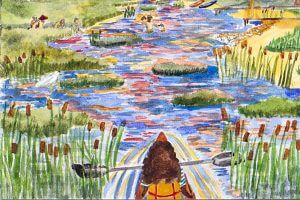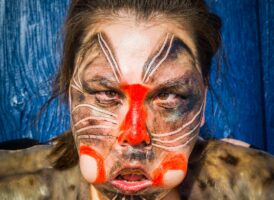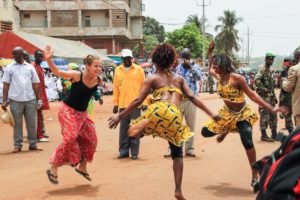Support Hidden Compass
We stand for journalism, science, history, and hope. Make a contribution to Hidden Compass and stand with us.
On the morning of his fifth birthday in November of 1942, Victor Osherovich woke up in Volsk, a small, quiet town more than 500 miles from war-torn Moscow. A sleepy community on the Volga River, Volsk had two main streets: First Brick Road, and Second Brick Road, named for the buildings that lined them; the rest were built from wood.
Wartime rations were tightly controlled. Food was distributed strictly by individual “ration cards.” Victor and his mother spent hours each week waiting in endless lines to receive their allotted amount. The wait, often exhausting, occasionally broke into conflict: Once, waiting for milk at the market, the young boy witnessed an angry crowd charge after two women for trying to cut the line.
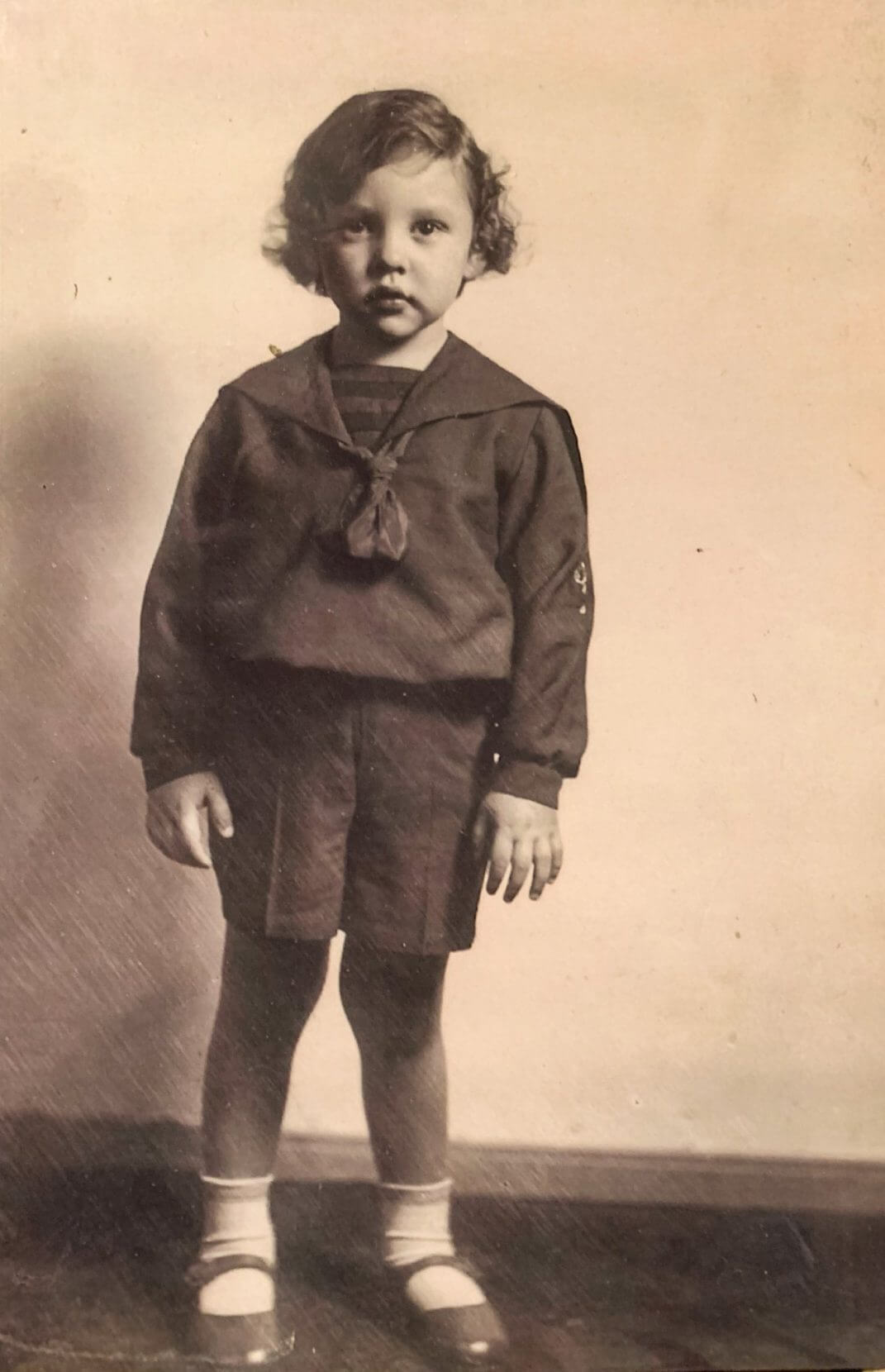
A curly-haired Victor Osherovich at five years old in Volsk. Photo courtesy of Sonya Pevzner.
Despite the hunger, Victor’s family tried to keep things lively. His aunt procured a children’s sled, and little Victor spent many days that winter exuberantly sledding down the snowy banks near the river.
There was no flour for a birthday cake for this playful little boy with curly golden hair, but this didn’t stop his Jewish mother, who could not bear to let her only child go without celebration. On his fifth birthday, she presented him with the best she could make: an earthy, layered “cake,” as Victor recalls it, made of thin slices of potato peels.
~~
On a cold Friday in January, my girlfriend and I head to the kitchen in our mountain home in Colorado to make challah.
Outside, the wild mountain wind has swept the snow into piles against the walls, but inside, the crackling wood stove brings a cheery warmth to our home. A blue-patterned Soviet dish towel hangs in the kitchen, tangy beet soup chills in the fridge — small indications of my roots.
May 8th — the 75th anniversary of the Allied Forces’ victory over Nazi Germany, celebrated as V-E Day — is still several months away. This past autumn, my beloved grandparents turned 82, and I know that my time with them is coming to a close. In our family, as in many, they are the last generation to remember the horrors of World War II.
The majority of us have never experienced a global catastrophe before. But those who lived through WWII have. Once these children of the war are gone, who will remind us of the power of resilience?
My grandparents were three years old on the day the Nazis declared war with the Soviet Union. No one knew what the next six years would bring: a war that would reach every corner of the globe and take some 24 million Soviet lives; the systematic, state-sponsored execution of more than 6 million Jews, Roma, homosexuals, political dissidents, and people with disabilities; and the irreparable changes to my own family’s history.
Time brings healing, but it also muddles memories. Hunger, genocide, and war are not just echoes of the past. Even now, in 2020, though most of us live without rations on staples like flour, fear has left the shelves at grocery stores barren. How do we cope? The majority of us have never experienced a global catastrophe before.
But those who lived through WWII have. Once these children of the war are gone, who will remind us of the power of resilience?
~~
I measure out four brimming mugs of flour, then add everything to the red KitchenAid mixer on the counter, a relatively new addition to challah’s millennia of tradition.
We started making challah in the morning to give us enough time. Once the dough is kneaded, we will let it rise three times — first for two hours, then for an hour, and finally for half an hour. All told, we will spend five hours from start to finish, before molding the yeasty dough into its final sweet, golden-braided state.
Like challah, I’m braided, too — half Orthodox Russian, half Jewish, but both sides trace lineage to Eastern Europe. In a family of mixed identities, life hasn’t always been sweet. Years of strained relationships between European Jews and Orthodox Christians took its toll on my family. Now, decades later, old wounds have mostly healed, but there’s a new identity challenge for my family — me.
There’s no recipe for intersecting identities, but bread seems to span the generations. It gives me a connection to the dead.
I take a deep breath and sink my weight deep into the yielding ball of dough on the countertop, kneading my history together.
~~
In the winter of 1941-42, after losing several fingers and toes to intense frostbite, Yoel Isaacovich and his family set out to escape from Leningrad. The Siege of Leningrad had begun just a few months earlier in September, when Adolf Hitler had ordered German forces to surround the port city on the western shore of Russia. They bombed and shelled the city daily, but rather than suffer the heavy losses of invading it, Hitler decided to starve Leningrad to death. Nazi scientists calculated rates of starvation and estimated that Leningrad would fall within weeks. The siege would ultimately last 872 days.
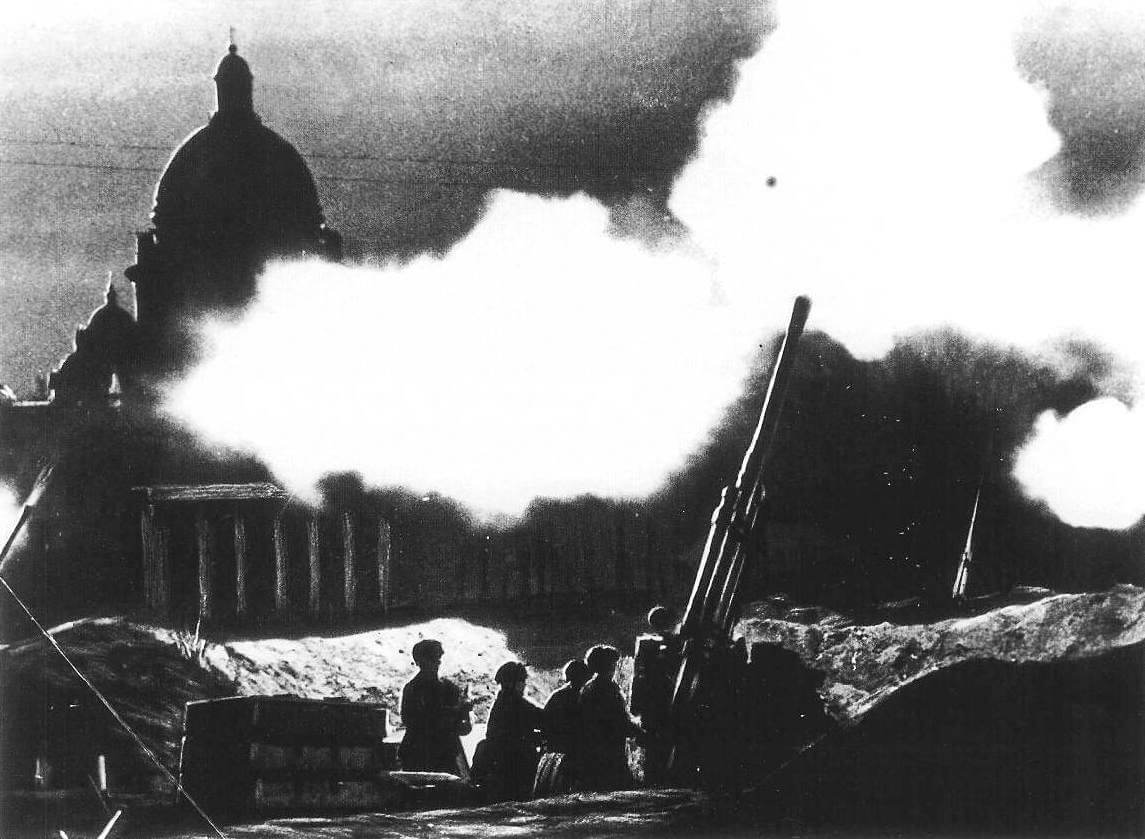
Anti-aircraft guns deployed in the neighborhood of St. Isaac’s cathedral in 1941 during the defense of Leningrad (now St. Petersburg). Photo: Unknown
That first winter — “the hungry winter” — was unforgiving. Temperatures sometimes dropped to -40°F. The icy sea air gave no respite, and blockaded survivors lived without heating. All but one supply route to the city was cut off, and most food rations, though still meager, were reserved for those who could work — adult men, largely. Children and the elderly were left to fend for themselves. Workers’ rations amounted to 250 grams of bread per day. Everyone else received 125 grams, not much more than a deck of cards, which they supplemented with anything else they could find: wallpaper paste, mechanical grease, saw dust, jelly made from boiled leather, pets, even each other.
When walking around the city, Yoel would occasionally see corpses in the rubble that were missing their buttocks — evidence of the cannibalism. Others reported that amputated limbs from the hospital would go missing, and some parents kept their children in at night for fear that they would be eaten. Even so, the streets were strewn with dead bodies, and most survivors simply nudged them aside and kept on walking. No one had the strength to bury the dead in the frozen ground, or to clear the rubble as buildings collapsed from the daily air raids and artillery bombardments.
Yoel’s family’s only hope of survival lay aboard a truck that would transport the injured, women, and children on Doroga Zhizni — the Road of Life. The ice road across frozen Lake Ladoga — the largest lake in Europe — was the only route in and out of Leningrad. Spots on the vehicle were hard to come by, but one of Yoel’s brothers secured spaces for all three brothers and their mother. The siege, however, had already taken a toll on their father — weak and sick, he was unfit to travel.
“Leave me behind,” he pled with the family.
Covering his father with a warm winter coat, Yoel pulled him to the hospital in a sled, where they said a heartbroken goodbye. There would be no saving his father, even in a place built for saving lives. Massive German artillery and bombing campaigns had been aimed at destroying Leningrad’s hospitals. Thousands of nurses and doctors had already been killed at work.
Yoel left his father there, covered with the coat, which he knew would be stolen the minute he turned his back. He had no choice. To stay would have been a death sentence for them both.
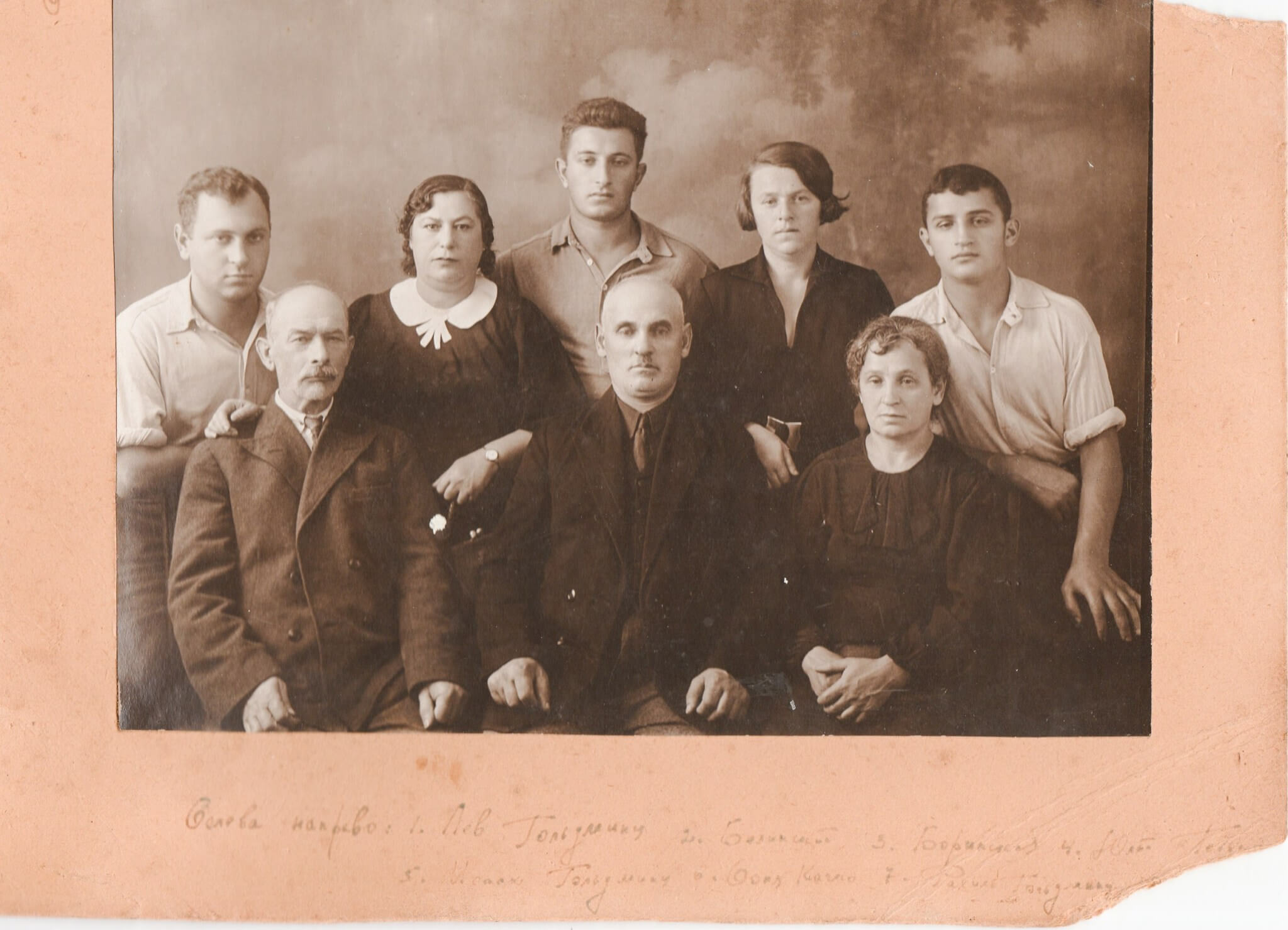
Long before V-E Day, Yoel Isaacovich (back center) poses for a family portrait. His brothers Lev (back left) and Abrasha (back right) stand behind their father, Isaac Goldmintz (front center), and mother, Rachel Goldmintz (front right). Photo courtesy of Sonya Pevzner.
~~
“You have to let the dough rise, then you can punch it down,” explains my cousin Ruchel. She’s petite, with dark features and our family’s characteristically thick, waist-length hair. “It will rise again,” she assures me.
It’s late December, and the warm smell of rising challah fills my childhood home in upstate New York. The wallpaper in my parents’ kitchen is peeling, the yellow pineapple print along the ceiling browned and aged.
Unlike my quiet home in the Colorado mountains, these walls hold decades of childhood memories. Giggles echo into the kitchen as Ruchel’s raucous daughters climb onto my girlfriend like she’s a jungle gym.
Much of my family has come to accept — even love — my girlfriend, who has joined me on this trip home. She’s tall and willowy, and her tan and freckled face shows her love for sunshine.
As I watch my blended family gather for the winter holidays, I am grateful for the resilience of previous generations. We are here thanks to their strength.
Most of us share a common family member: my Jewish great-grandfather, Yoel.
~~
When Yoel breathlessly arrived at the main train station to meet the evacuation trucks, his two brothers and his mother were already in a vehicle. They frantically gestured to him to join them, but the truck next to it had a free spot, too — and Yoel took it.
As the convoy fled, enemy bombs and 100-pound artillery shells rained down, tearing holes through the ice around them. The drivers didn’t stop. For 20 exposed and terrifying miles, they simply drove in a desperate attempt to reach the other side. Because Yoel’s mother and brothers were in a truck behind him, he could not hold on to them through the explosions. He could not comfort them. They could not reassure each other. It must have seemed an eternity to reach the opposite shore.
But the relief of Yoel’s safe arrival was short-lived: my great-grandfather spent day after agonizing day waiting for his mother and brothers to arrive.
They never came.
Holding to a shrapnel of hope — maybe they missed each other in the chaos of landing? — Yoel would spend the rest of his life searching for them, to no avail.
Yoel’s two brothers and both parents count toward the more than one million Leningrad civilians who died due to starvation, violence, and cold. This number is still debated, but if it’s accurate, the city of Leningrad suffered as many WWII deaths as the United States and the United Kingdom — combined.
~~
Sometimes, the distance to the past feels unbreachable — the wisdom of resilience beyond recollection, the persistence of intolerance beyond understanding.
The lives of the war are lost forever, but we do what we can to remember the people who came before us — Ruchel is named after Yoel’s beloved mother. Ruchel’s youngest, who is hanging off my girlfriend’s arm like a monkey, is named Aliza Yoella — in memory of Yoel and his wife Liza.
We do what we can to remember. But sometimes, the distance to the past feels unbreachable — the wisdom of resilience beyond recollection, the persistence of intolerance beyond understanding.
What would Yoel and Liza think of their great-granddaughter playing with the type of person who would have been murdered 75 years ago?
~~
My grandmother Margarita was born in 1937, in Moscow. She grew up in a different world than the one I live in. One weekend when she was nearly four, she and her father planned to visit family in the village of Sosnitsi, Ukraine. But someone fell ill, and the visit was postponed.
That weekend, Nazis invaded Sosnitsi. Margarita’s aunt, a 21-year-old who taught school for the deaf and blind, shared my name: Sonya. The Nazis shot her, along with every Jew they could find.
I can’t help but wonder what she was like, this namesake of mine. What would she have said, had she known that one day I would share her name?
When I came out as gay at the age of 12, my family’s reactions ranged from denial to outright horror. That was 15 years ago. In that time, many have changed their stance. Some have not.
I fear what my namesake would say, seeing my girlfriend and I make challah together. I fear she, like Margarita, would refuse to see photos of my girlfriend or use her name.
How do I braid in that heartbreak?
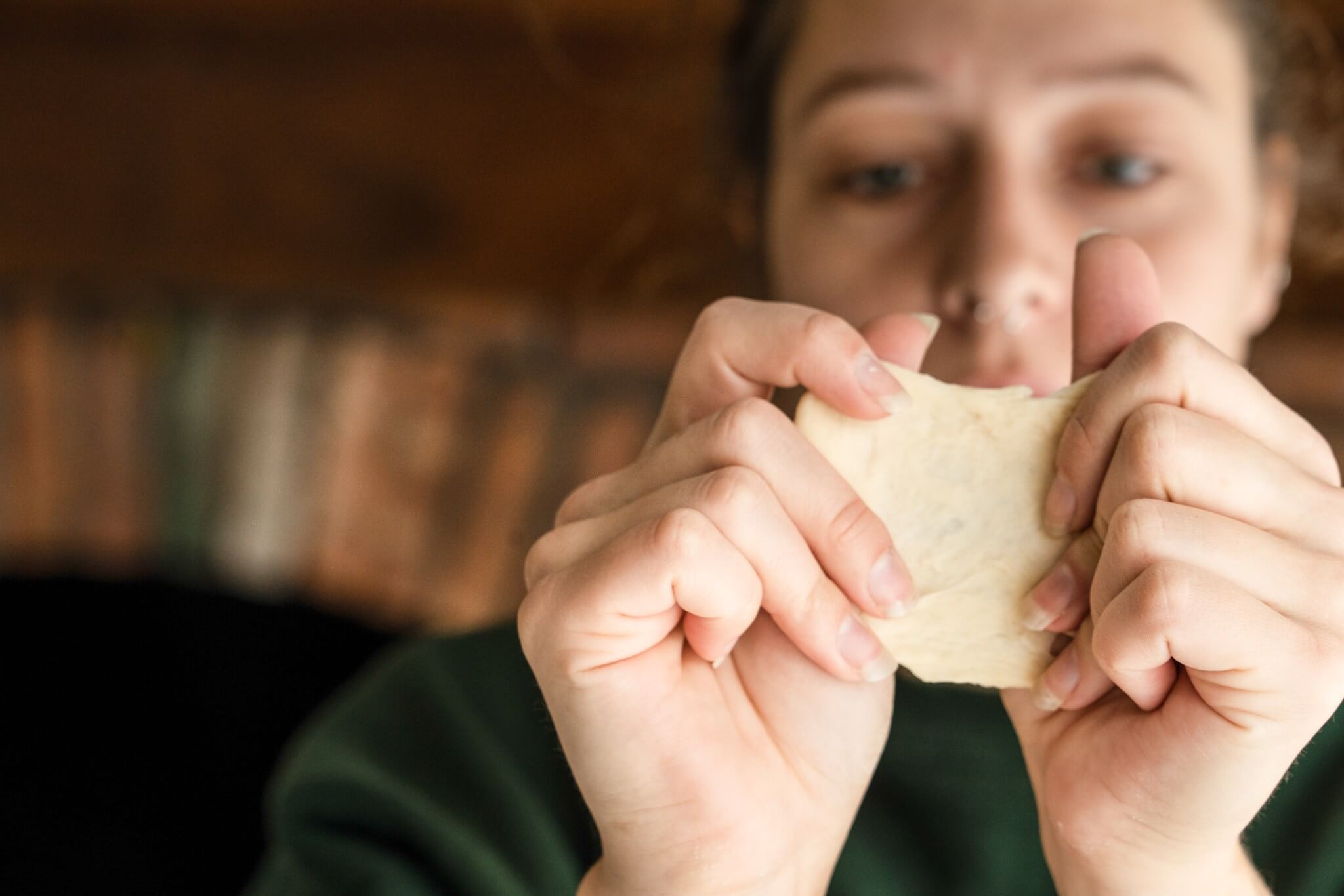
As the 75th anniversary of V-E Day approaches, author Sonya Pevzner (pictured here) turns to a family tradition to find the braids that hold us together. Photo: Halcy Brook Webster.
~~
“The years following the war were very hard,” explains my grandfather a few weeks after the holidays. He’s in his 80s now, but age hasn’t dulled the sparkle in his eyes. In many ways, he still acts like that playful five-year-old from Volsk who once celebrated his birthday with a potato peel cake: He frequently makes up little songs and dances as he shuffles around the house.
“Flour was rationed,” he says, “And so were U.S. relief supplies. We were very hungry.”
I nod, listening, but I don’t really know what it’s like to be hungry.
“We were issued a small plot of land,” he continues. “We grew our own potatoes for years — in the winter, it’s all we ate.”
He chuckles. “I still love potatoes — bread, too. Every family in the Soviet Union remembers the war. It’s not uncommon for older folks to keep stale bread long past when it’s edible — old memories die hard, you know.”
A few weeks later, I ask my grandfather if he will welcome my girlfriend when he meets her.
“With open arms,” he responds.
~~
If this could happen to them, why not me? Why not now?
It’s late on this cold Friday night when I sit down in my mountain home to remember these stories. My girlfriend has spent all day kneading the challah dough and letting it rise by the wood stove as the January wind howls outside our door.
As we braid the sacred Jewish bread together, I cry, remembering the people who did not make it, thinking of those who barely survived. Although the kitchen is warm, I shiver — if this could happen to them, why not me?
Why not now?
Seventy-five years ago, as winter held its icy grip over Europe, my family and millions of others battled for survival. But tonight, it’s peaceful in my home. I light the Shabbat candles, and check on the bread. Golden, crispy, and hot in the oven — just as it should be.
I think of the Jewish prayer for bread: Barukh ata Ad-nai …
Our survival here is based in large part on luck. What if Yoel’s truck had not made it across the frozen sea ice? What if my grandmother had gone to visit Sosnitsi that weekend? Would I still be here to wonder about my family’s approval? How would our world be different?
… Eloheinu, Melekh ha’olam …
I break off a chunk of sweet bread and decadently slather it in butter, then drizzle honey over the top. In a few short months, when the world celebrates the 75th anniversary of the formal acceptance by the Allied Forces of Nazi Germany’s surrender, will they mention the countless gay lives lost among the lists of Jewish names?
On a night like tonight, as I remember my family’s enduring resilience and celebrate my own freedom, it seems appropriate to indulge. Sitting down in my home in the middle of America, I begin to braid our stories of resilience together.
…hamotzi lekhem min ha’aretz.
One-third Russian, one-third Jewish, and one-third gay; each strand supporting the other. Without the braid, challah isn’t challah.
Today, I can make as much challah as I want without fear of genocide. I visit Leningrad, now St. Petersburg, by choice. I take the train without fear of bombings. I grow potatoes for pleasure. My tattoos are of mountains, not numbers on my forearm. And, despite both real and perceived family rejection, I can marry my girlfriend.
On this Friday night, these blessings taste sweet as challah.
Amen.
###
Ruchel’s challah recipe:
Mix 1.5 tablespoons of yeast, 1 tablespoon of sugar, and 1 mug of warm water. Let it bubble.
Combine 4 mugs of flour, 1/3 mug of sugar, 1/4 mug of oil, 1 tablespoon of salt, and one egg.
Mix everything together with the yeast until all the flour is incorporated. Add more water if needed.
Knead the dough for 10-15 minutes until it’s stretchy. It should be thin enough to see light through it, but not so thin that it breaks. When in doubt, keep kneading.
Cover and let rise for 1.5-2 hours.
Punch it down all the way.
Cover and let rise for 45-60 minutes.
Punch it down.
Divide the dough into two halves, then divide each half into three equal sections.
Roll each of the three sections into a long, thin roll, then form the braid, pinching the ends shut. Repeat with the other half.
Cover and let the braids rest for at least 30 minutes.
Bake at 250F for 10 minutes. Then, 350F for 16-20 minutes (depending on your oven and size of challah).
Serve warm.
Author’s note: Learning to braid challah is a life-long skill.
Sonya Pevzner
Sonya Pevzner's experience as a queer Russian-Jewish refugee informs much of her work, from storytelling to activism.
Never miss a story
Subscribe for new issue alerts.
By submitting this form, you consent to receive updates from Hidden Compass regarding new issues and other ongoing promotions such as workshop opportunities. Please refer to our Privacy Policy for more information.

